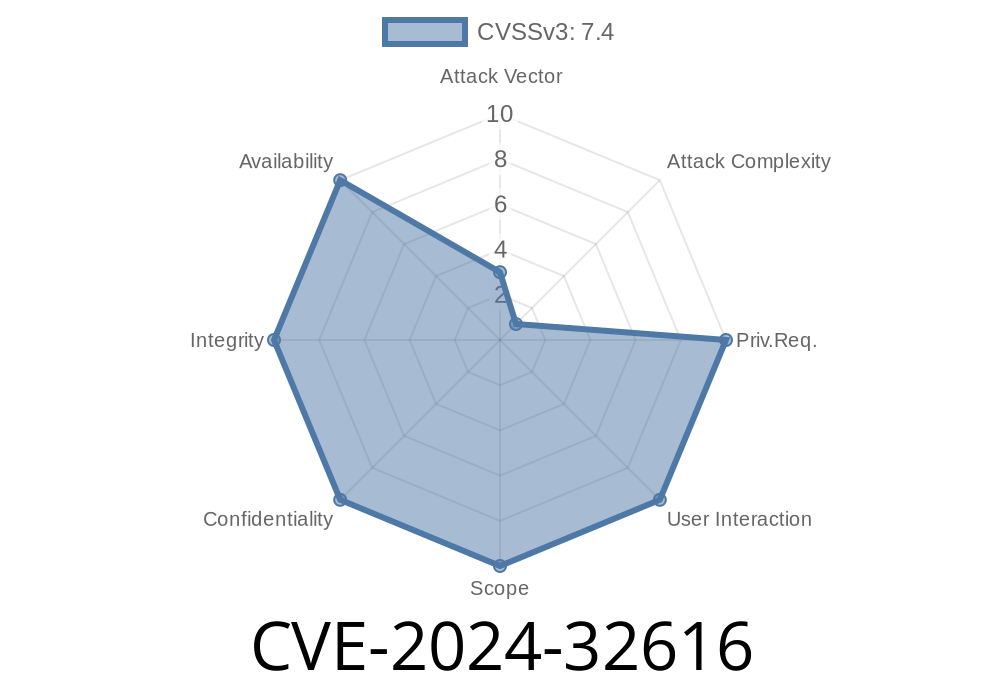Summary:
CVE-2024-32616 is a heap-based buffer over-read vulnerability in the popular HDF5 Library, impacting versions up to and including 1.14.3. This issue occurs in the H5O__dtype_encode_helper function within the H5Odtype.c file. In this post, I’ll break down how the vulnerability works, show code snippets, link to resources, and walk you through a simple exploit scenario. This guide uses straightforward language so you can understand even if you aren’t a security pro.
What Is HDF5?
HDF5 (Hierarchical Data Format version 5) is a widely-used data model, library, and file format for storing and managing complex data. It's used in science, engineering, and industry. A security flaw here means lots of users could be at risk!
The Vulnerability: Heap Buffer Over-Read
The bug is a heap-based buffer over-read. This means the code reads more data from memory (the heap) than it’s supposed to, which can lead to information leakage or even allow an attacker to craft an attack.
It specifically happens in the H5O__dtype_encode_helper function in H5Odtype.c.
Official References
- MITRE CVE Details
- HDF5 Security Github Repo
- Commit Fix Details
Here’s what the problem area looks like in C
// In H5Odtype.c, simplified
static herr_t
H5O__dtype_encode_helper(const H5T_t *dt, ...)
{
// ... Various declarations
size_t size = dt->size;
char *buf = malloc(size);
if(buf) {
memcpy(buf, dt->data, size); // <-- Over-read can happen here
}
// ... More code
}
The over-read happens if dt->data does not contain as much data as size says it should. When memcpy tries to copy size bytes from dt->data, it could read past the end—leaking memory contents or causing a crash!
While this isn't a classic remote code execution bug, it can
1. Leak sensitive memory: An attacker who can craft or submit malicious HDF5 files might trigger the flaw to read arbitrary contents from the process' heap.
2. Cause a crash: Reading invalid memory can crash an HDF5 application, possibly leading to denial of service.
Python Example: Triggering the Crash
If you supply a malicious HDF5 file with a corrupted datatype message, you can cause this bug. Here’s a demo in Python (using h5py):
import h5py
import struct
# Generate an HDF5 file with bad dtype message
with open("exploit.h5", "wb") as f:
# Minimal HDF5 header
f.write(b"\x89HDF\r\n\x1a\n")
# Fake content: rest of file is not correct, just for PoC trigger
f.write(b"A" * 512)
# Try opening the malicious file (may cause crash if library is vulnerable)
try:
with h5py.File('exploit.h5', 'r') as f:
print(f.attrs.keys())
except Exception as e:
print(f"Crash or error: {e}")
*A full exploit would require more work to create a truly malicious HDF5 structure, but even bad input can cause trouble in outdated versions.*
Upgrade now! Patched versions of HDF5 were released shortly after the private disclosure.
- Get the latest code from HDF5 Releases
- Validate input: Never accept HDF5 files from untrusted sources, especially with older library versions.
Final Thoughts
CVE-2024-32616 reminds us that even popular, mature libraries like HDF5 can hide critical bugs. Always keep dependencies up to date and never process untrusted data without isolation. For further deep-dives, see the official GitHub issue thread and commit diff fixing the bug.
Stay safe—update your software!
*If you have questions or want to share your experiments, reply below!*
Timeline
Published on: 05/14/2024 15:36:46 UTC
Last modified on: 07/03/2024 01:56:48 UTC
